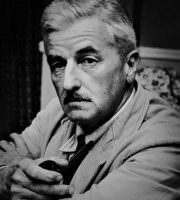About William Faulkner
William Faulkner, (September 25, 1897 in New Albany, Mississippi - died July 6, 1962 in Byhalia, Mississippi) was an American poet, novelist and short story writer. He published his first volume of poetry Vision in Spring, in 1921, followed by The Marble Faun (1924) and This Earth, a Poem (1932). He was awarded the Nobel Prize for Literature in 1949, when He was still relatively unknown. He is best known for his novels and short stories, but he has also published many poems, works of children's and youth literature and worked occasionally as a scriptwriter for the cinema.Faulkner, who set most of his stories in his home state of Mississippi, is one of the most influential Southern writers, along with Mark Twain, Robert Penn Warren, Flannery O'Connor, Truman Capote, Tennessee Williams and Carson McCullers. Beyond this belonging to Southern culture, he is considered one of the greatest American writers of all time and a major writer of the 20th century, who exerted a great influence on the following generations thanks to his innovative contribution.
His best-known novels are The Sound and the Fury (1929), While I am Dying (1930), Sanctuary (1931), Light of August (1932) and Absalon, Absalon! (1936), often considered one of the greatest masterpieces of universal literature. He received the Pulitzer Prize for Fiction for A Fable (1954), then the National Book Award posthumously for all his work.
Browse all poems and texts published on William Faulkner









